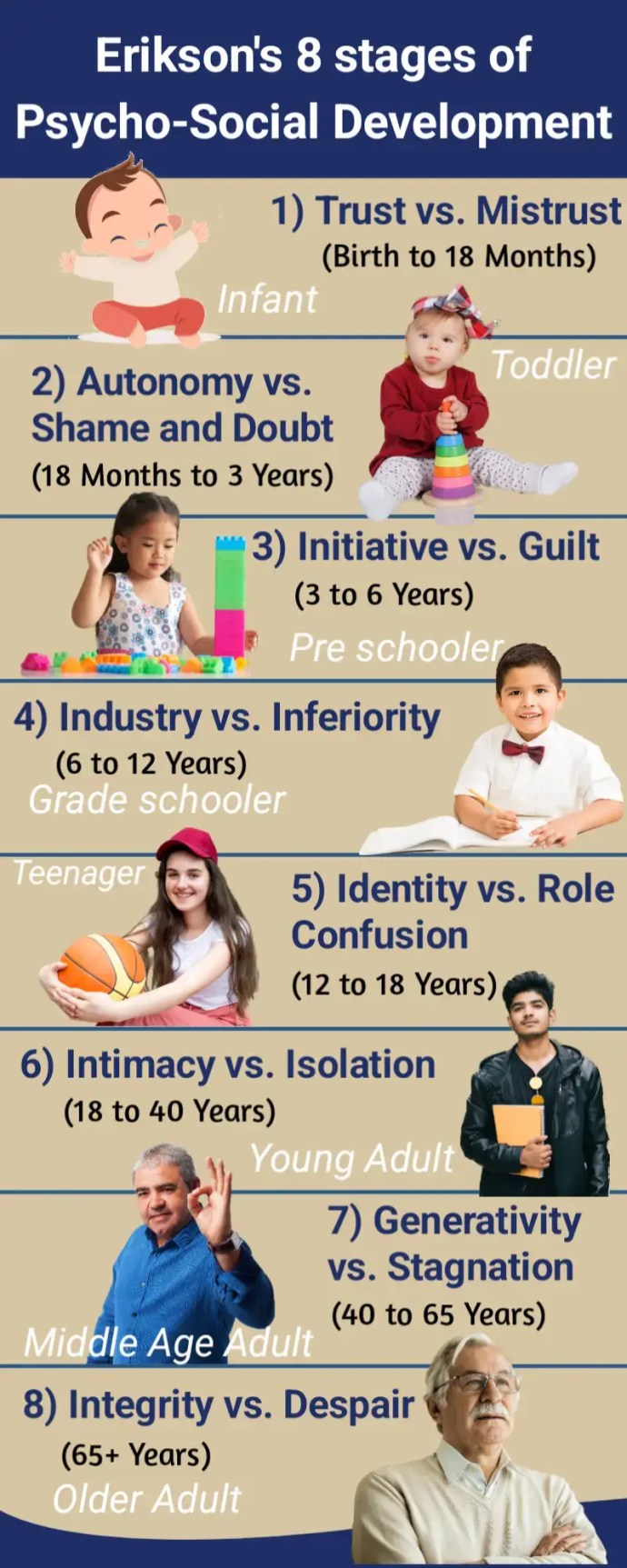If you are searching for notes on Stages of Social Development or Erikson’s theory of Psychosocial development then you are at right website. Here we have discussed point wise about the Erikson’s theory of Psychosocial development in detailed. You can also download the free PDF on Stages of Social Development.
Table of Contents
- 1 Explain the stages of Social development | Erik Erikson’s theory of Psychosocial development
- 2 Erikson’s 8 stages of psychosocial Development
- 2.1 Stage 1: Trust vs. Mistrust (Birth to 18 Months)
- 2.2 Stage 2: Autonomy vs. Shame and Doubt (18 Months to 3 Years)
- 2.3 Stage 3: Initiative vs. Guilt (3 to 6 Years)
- 2.4 Stage 4: Industry vs. Inferiority (6 to 12 Years)
- 2.5 Stage 5: Identity vs. Role Confusion (12 to 18 Years)
- 2.6 Stage 6: Intimacy vs. Isolation (18 to 40 Years)
- 2.7 Stage 7: Generativity vs. Stagnation (40 to 65 Years)
- 2.8 Stage 8: Integrity vs. Despair (65+ Years)
- 3 Conclusion :
Social development refers to the process by which individuals learn to interact with others and form relationships. There are several different theories of social development, but one of the most well-known is Erik Erikson’s theory of psychosocial development. This theory outlines eight stages of social development that individuals progress through from infancy to old age. In this article, we will discuss the stages of social development as outlined by Erikson.

Following are the Erikson’s Eight stages of psychosocial Development :

Stage 1: Trust vs. Mistrust (Birth to 18 Months)
During this stage, infants learn to trust or mistrust their caregivers based on the quality and consistency of their care. Infants who are cared for consistently and lovingly develop a sense of trust, while those who are neglected or inconsistently cared for may develop mistrust.
Stage 2: Autonomy vs. Shame and Doubt (18 Months to 3 Years)
During this stage, toddlers learn to assert their independence and develop a sense of autonomy. They also learn to control their bodily functions and develop a sense of self-control. If they are successful in this, they will develop a sense of autonomy, but if they are criticized or punished for their attempts at independence, they may develop shame and doubt.
Stage 3: Initiative vs. Guilt (3 to 6 Years)
During this stage, children learn to initiate and plan activities, and to explore the world around them. They also learn to take responsibility for their actions. If they are successful in this, they will develop a sense of initiative, but if they are criticized or punished for their attempts at independence, they may develop guilt.
Stage 4: Industry vs. Inferiority (6 to 12 Years)
During this stage, children learn to be productive and to complete tasks. They also learn to compare themselves to others and to develop a sense of competence. If they are successful in this, they will develop a sense of industry, but if they feel that they are unable to complete tasks or compare poorly to others, they may develop a sense of inferiority.
Stage 5: Identity vs. Role Confusion (12 to 18 Years)
During this stage, adolescents form a sense of identity, including their values, beliefs, and goals. They also begin to form relationships outside of the family. If they are successful in this, they will develop a sense of identity, but if they are unable to form a sense of identity, they may experience role confusion.
Stage 6: Intimacy vs. Isolation (18 to 40 Years)
During this stage, individuals form close, intimate relationships with others. They also develop a sense of commitment to their partners and to their careers. If they are successful in this, they will develop a sense of intimacy, but if they are unable to form close relationships, they may experience isolation.
Stage 7: Generativity vs. Stagnation (40 to 65 Years)
During this stage, individuals contribute to society through work, community involvement, and raising children. They also reflect on their lives and the legacy they will leave behind. If they are successful in this, they will develop a sense of generativity, but if they feel that they have not contributed to society, they may experience stagnation.
Stage 8: Integrity vs. Despair (65+ Years)
During this stage, individuals reflect on their lives and come to terms with their mortality. They also develop a sense of wisdom and accept that life is finite. If they are successful in this, they will develop a sense of integrity, but if they feel that their lives have been wasted, they may experience despair.
Conclusion :
In conclusion, Erik Erikson’s theory of psychosocial development outlines eight stages of social development that individuals progress through from infancy to old age. Each stage involves a different task, and success or failure in each.
- Cognitive theory of Development (Piaget’s)
- Theory of psycho- sexual development (Freud)
- Theory of Emotional Development (Goleman)
- Principles of Development
- Stages of Growth and Development
- Kohlberg’s stages of moral development
If you like this notes please share your experiences below in comment box. You can join our Telegram Channel to get the latest Notification on B.Ed notes every time we upload.
👉Upload Here
And you will get some goodies from us 🙂
Nice Notes 🙂. Please upload B.Ed 2nd year Notes PDF.